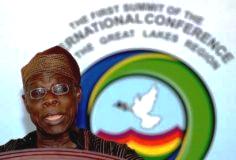15 African leaders sign pact aimed at ending cycle of war
By SUKHDEV CHHATBAR
DAR ES SALAAM, Tanzania, Nov 20, 2004 (AP) — Fifteen African leaders signed Saturday a framework agreement that took ten years to reach aimed at ending the cycle of war and dictatorship in central Africa, but U.N. Secretary General Kofi Annan warned “the job is far from over.”

|
|
Nigerian President Olusegun Obasanjo speaks during the end of a two-day U.N. backed summit on Africa’s troubled Great Lakes region in Dar Es Salaam, Tanzania November 20, 2004. (Reuters). |
The United Nations and the African Union organized the two-day summit that began Friday on central Africa’s Great Lakes region hoping that it will mark a watershed for the region where millions die in wars, rebellions and a genocide in the past decade.
“We, the African leaders have agreed to rededicate ourselves for peace and development of our continent,” said Nigerian President Olusegun Obasanjo, the African Union’s current chairman. “Never, and never again, shall we allow any despots or any tyranny in our continent.”
It took ten years to get the heads of all central African countries at the same table, Annan said.
“It is in the months to come as you strive towards collecting the dividend of peace through a comprehensive security, stability and development pact, that your commitment will meet its greatest test,” Annan told the assembled African leaders.
Heads of states attended from Congo, Kenya, Sudan, Burundi, Malawi, Uganda, Rwanda, Zambia, Nigeria, Tanzania, Zimbabwe, Mozambique, South Africa, Republic of Congo and Central African Republic.
Annan told journalists later that he met with Sudan’s President Omar el-Bashir for about an hour on Saturday. Bashir assured him that Sudan was committed to meeting it obligations set out in a peace deal signed Friday to end a 21-year war with southern Sudan rebels by Dec. 31, Annan said.
On Friday Sudan’s Vice President Ali Osman Mohammed Taha and the leader of the main southern rebel group, John Garang, signed the agreement before an extraordinary session of the U.N. Security Council.
“This is going to be a challenge. If they conclude (an agreement) there will be a lot of assistance,” he said, adding that without peace, nobody is going to put money into Sudan.
Both Sudan and southern rebels have promised several times in the past to conclude a peace deal by a certain date only to miss the deadline.
Africa’s Great Lakes region _ an area bordered by Congo, Rwanda and Burundi _ has been unstable since the 1994 genocide in Rwanda in which more than 500,000 people, most of them from the country’s Tutsi minority, were slaughtered by a regime of extremists from its Hutu majority.
After Tutsi rebels ended the Rwanda genocide, the extremist Hutus fled into eastern Congo, launching raids on Rwanda and triggering a Rwandan invasion of its much larger neighbor in 1996.
Rwanda, along with Uganda and Burundi, again invaded in 1998 to back Congolese rebels, sparking a war that drew in six African nations and killed an estimated 3.3 million people, most dying from war-induced hunger and disease. The conflict ended in June 2003, although sporadic fighting continues in parts of Congo.
Congo’s conflict also aggravated the 11-year civil war in Burundi, a conflict that is still simmering. More than 260,000 people, mostly civilians, have been killed in the conflict between the Tutsi-dominated army and Hutu rebel factions in Burundi.
